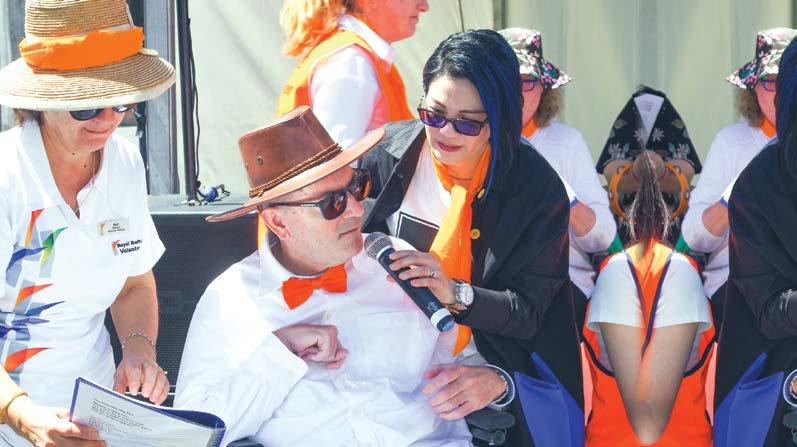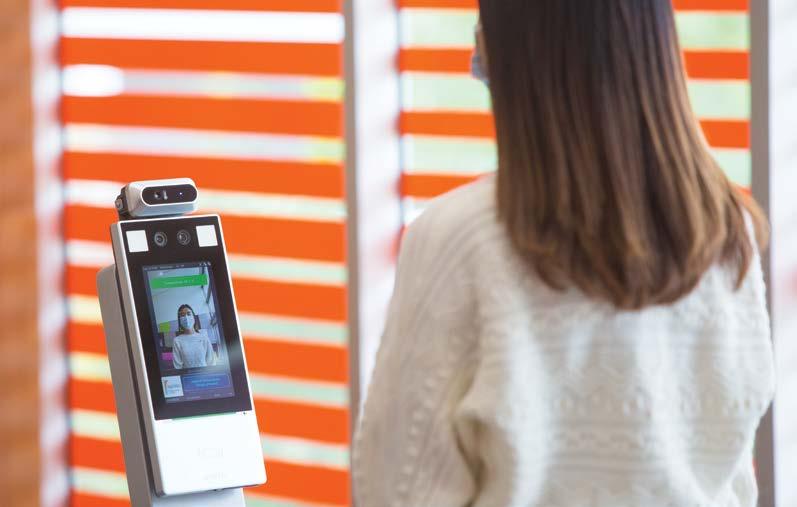
6 minute read
Education and Research
271
nursing and allied health students supervised
Advertisement
14
articles published in peer-reviewed journals
Education and research continue to be priority objectives at Royal Rehab managed through our centre of excellence, The Ducati Owners Club of NSW Education and Research Hub.
Pictured top: Julie Pryor, Director Research and Innovation. Named after our long-term supporter, the Hub represents our commitment to the education of staff and students, and to the advancement of rehabilitation and disability services.
New Director Research and Innovation
Research and innovation is an increasingly important area at Royal Rehab, and to this end, we have created a new role — Director of Research and Innovation. We have appointed Julie Pryor to this position where she will support research culture throughout the organisation. “I am delighted to provide leadership in relation to research and innovation at Royal Rehab. It is through a strong culture of innovative evidencebased thinking that we can foster and promote the development of research skills and facilitate partnerships that will help shape the future for the people we serve.’’
Julie Pryor, Director Research and Innovation
Leading Research Highlights
Royal Rehab’s research covers many domains including spinal cord injury, traumatic brain injury and rehabilitation practice. We have a long history of leading research projects and collaborating with other researchers to enable the evidence base informing service delivery to grow.
Spiritual Care Practice: Trialling a Staff Training Program in Rehabilitation Kate Jones, Julie Pryor, Candice Care-Unger and Grahame Simpson
This two-module training program for medical, nursing and allied health rehabilitation staff was effective in increasing self-reported competency, confidence and comfort in spiritual care delivery. During follow-up interviews, participants expressed understanding that ‘spirituality is everybody’s business’. Specifically, participants reported: increased awareness of the nature of spirituality; realisation of the importance of spirituality to clients; a desire to keep spirituality on the radar; examples of incorporating spiritual care in practice; and recognition of spirituality as personally meaningful. The findings confirm that brief spiritual care training can positively impact upon perceptions and practice of rehabilitation professionals.
Interviews with Healthcare Professionals and People with Spinal Cord Injuries to Guide the Development and Rollout of Physiotherapy Clinical Practice Guidelines Lisa Harvey, Joanne Glinsky, Donna Rainey, Amanda Haber, Marsha Ben, Sophia Denis and Lydia Chen
This qualitative study which aims to understand the perspectives of healthcare professionals and people with spinal cord injuries on physiotherapy treatments has been conducted in the Spinal Injury Unit at Royal Rehab. The project was a collaboration between physiotherapists in the spinal units across NSW and the University of Sydney. Results of the study will be used to guide the development and subsequent rollout of clinical practice guidelines for physiotherapists working with people who have sustained a spinal cord injury. Exploring Food and Nutrition Knowledge, Attitudes and Behaviours of Spinal Patients in Specialist Rehabilitation Priya Iyer, Eleanor Beck and Karen Walton
Good nutrition knowledge facilitates healthy eating practices. This recent cross-sectional study explored nutrition knowledge, attitudes, and practices in individuals with spinal cord injury. The findings affirmed the need for timely nutrition intervention and knowledge translation strategies in spinal cord injury rehabilitation.
The Nature and Predictors of Readmissions to Acute Care from Inpatient Rehabilitation: a Retrospective Cohort Study Duncan McKechnie, Murray Fisher, Julie Pryor and Rochelle McKechnie
This retrospective cohort design study of the records of 383 brain injury rehabilitation inpatients found that 83 (22%) experienced readmission to acute care for a total of 171 episodes. 37% of readmissions were due to hospital acquired complications with infection being the most common cause.
Patients requiring unplanned readmission to acute care were more likely to have lower Glasgow Coma Scale scores and Functional Independence Measure scores on rehabilitation admission, a higher burden of care on rehabilitation discharge, and be discharged to a non-home residence.
Rehabilitation admission Glasgow Coma Scale and motor Functional Independence Measure scores were identified as the independent predictors of unplanned readmission to acute care.
New Research Projects
1
Spiritual Care Practice: Trialling a Staff Training Program in Rehabilitation In collaboration with Ingham Institute of Applied Medical Research and funded by Community of Christ
2
The Nature of Readmissions to Acute Care from Inpatient Rehabilitation: a Retrospective Cohort Study In collaboration with the University of Sydney
3
Deteriorating Patients in Rehabilitation – a Bachelor of Nursing (Honours) Student Project In collaboration with the University of Sydney
4
Interviews with Healthcare Professionals and People with Spinal Cord Injuries to Guide the Development and Rollout of Physiotherapy Clinical Practice Guidelines In collaboration with the University of Sydney and funded by icare
5
On the Spot Use of Goals to Support the Biographical Work of Rehabilitation In collaboration with the University of Sydney and funded by the Australasian Rehabilitation Nurses’ Association
6
Utilisation of the Brannagan Executive Functions Assessment in Increasing Self Awareness in Relation to Goal of Return to Work in Individuals Post Traumatic Brain Injury – a Master of Clinical Rehabilitation: Neurological Occupational Therapy Student Project In collaboration with Flinders University
7
Exploring Food and Nutrition Knowledge, Attitudes and Behaviours of Spinal Patients in Specialist Rehabilitation – a PhD Student Project (2nd Out of 4 Projects) In collaboration with the University of Wollongong
8
Association Between Diet Quality, Lipid Profile and Body Weight in Patients with Spinal Cord Injury – a PhD Student Project (3rd Out of 4 Projects) In collaboration with the University of Wollongong
9
Improving Diagnosis of Verbosity Following Traumatic Brain Injury: a Descriptive Study In collaboration with Macquarie University
10
The Significance of Resilience on the LongerTerm Wellbeing of Family Caregivers, Service Utilisation and Client Community Participation: 3-Year Follow-Up An icare funded project led by Grahame Simpson (Ingham Institute)
Commitment to Education
Royal Rehab has a culture of continuous learning where we share our knowledge and research, support the ongoing education of our staff, and provide training for students and external clinicians.
During the year, we provided clinical education for nursing and allied health students from leading Australian and international universities. We continued to train undergraduate students from the University of Sydney School of Medicine and registrars from the Australasian Faculty of Rehabilitation Medicine. We are proud of our clinical professionals who held appointments and lecturing positions at higher education facilities.
COVID-19 Best Practice The COVID-19 pandemic had a major impact on staff training and education. We worked hard to keep abreast of the constantly changing infection control practices and social distancing restrictions to ensure that everyone, from doctors and nurses to cleaning staff and visitors, were both informed and educated across our facilities.
Australia-first Psychiatry Fellowship The Brain Injury Community Rehab Team partnered with the University of Sydney’s Brain and Mind Centre, the Royal Australian and New Zealand College of Psychiatry, icare, and other leading organisations in the inaugural Australia-first psychiatry fellowship in brain injury. Dr Jodi Cartoon was announced as the recipient of the fellowship which provided her a rare opportunity to develop skills in neuropsychiatry at Royal Rehab. Representation on World Health Organisation Committee Professor James Middleton, Senior Staff Specialist Spinal Outreach, Professional Leader of Social Work Candice Care-Unger and Professional Leader of Dietetics Priya Iyer accepted positions on the World Health Organisation Committee for the Development of a Package of Rehabilitation Interventions. The Package is designed to be a resource on evidence-based rehabilitation interventions for people with spinal cord injury living in low and middle-income countries.
International Social Work in Health Conference Research Project Officer Dr Kate Jones and Professional Leader of Social Work Candice Care-Unger attended the 9th International Conference on Social Work in Health and Mental Health in the United Kingdom to discuss research and innovative practice in social work in health settings. Dr Jones and Candice gave presentations on topics which included Building Family Resilience after Traumatic Injury and Spirituality in Rehabilitation.










